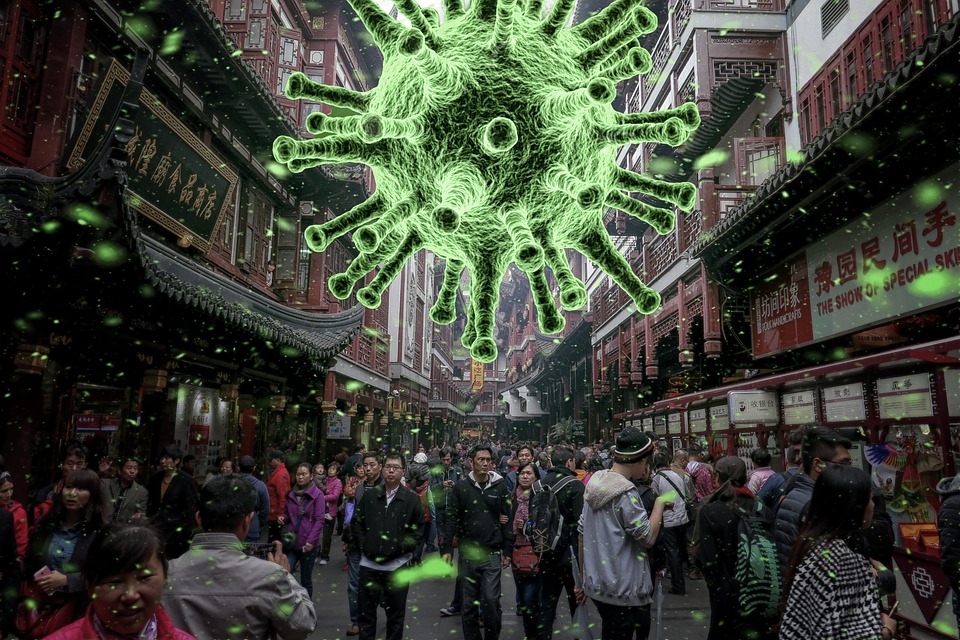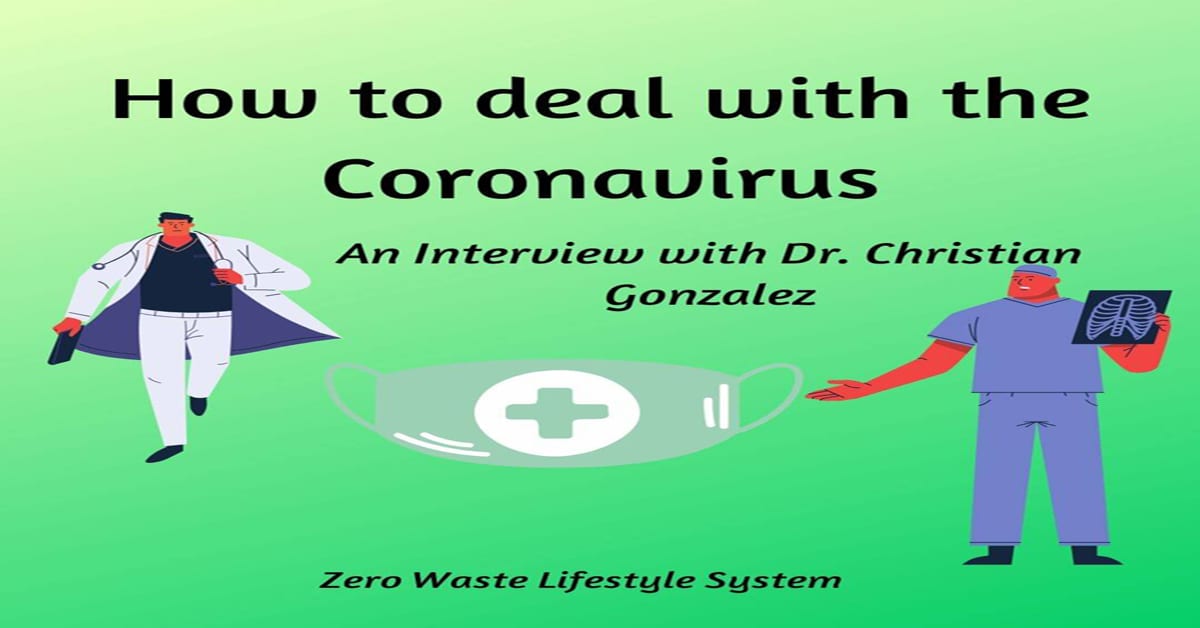The Coronavirus is sweeping through the world like Greek Fire. More people die and get infected than those who are healed. It’s easy to be overwhelmed by all the headlines and think of the worst. Panic buying, discrimination and fake news abound right now.
But in the grand scheme of things, what are we doing to deal with the coronavirus? Are we doing enough? Or not enough? Do we go zero waste in our approach to this pandemic?

Oh yes, I can talk about going zero waste in an article about the Coronavirus. Going zero waste is not just about eco-friendly habits such as reusing or buying eco-friendly products. Rather, I see it more as a philosophy of not wasting anything in your life from your resources to your mindset and efforts.
Going zero waste during the Coronavirus should mean that we try outmost to be rational and calm in dealing with the crisis. Instead of panicking away the whole quarantine period, we can better use this time to educate ourselves about the Coronavirus and how best to protect ourselves from it.
It is also the best time to start taking care of oneself through healthy eating such as eating more wholesome food, consuming less processed goods and more.
To help you understand the Coronavirus, I interviewed Dr. Christian Gonzalez, a Naturopathic Doctor that specializes in Integrative Oncology. Read on and learn to separate COVID facts from fiction.
Coronavirus or the current COVID-19 are human and animal pathogens. They are enveloped RNA viruses with a characteristic club like spike appearance and a large RNA genome. COVID-19 is a novel virus that we are still learning about in terms of behavior and treatment.
The current belief is that the virus began in the Wuhan wet markets in China. In these markets animals were butchered on the spot in poor hygienic conditions. They likely originated in bats and though not as pathogenic to them, coronaviruses can cause a variety of diseases in mammals and birds ranging from enteritis in cows and pigs and upper respiratory disease in chickens to potentially lethal human respiratory infections.
3. How is it spread?
Though understanding of transmission risk is incomplete, it is believed to be primarily spread through respiratory droplets. Talking, sneezing, coughing can all transmit the virus via respiratory secretions. Additionally folks can infect themselves by touching surfaces with the virus and then touching their mouth, nose, and eyes. At the moment there is uncertainty how long these viruses linger in the air for.
4. What differentiates COVID 19 from the influenza?
Coronavirus has a longer incubation period than the flu at about 1-14 days with 5 on average before symptoms arise. Flu is about 1-4 days. The symptoms for coronavirus are more gradual whereas flu is more abrupt. For symptoms specifically there is a lot of overlap in terms of fever, cough, fatigue, runny nose, nasal congestion, gastro-intestinal symptoms, sore throat and headache. Coronavirus manifests more commonly with shortness of breath and other respiratory issues. COVID-19 has a higher mortality rate than the flu as the chances for severe and critical infections are comparatively higher.
5. Some commentators said that COVID-19 is worse than SARS. Why?
The SARS outbreak in the early 2000’s was caused by Coronavirus. It spread via respiratory droplets just like the current COVID-19 pandemic. SARS had a higher death rate, meaning that more people died from contracting it. COVID-19 though has had more deaths overall. People infected with SARS had more severe symptoms much quicker and were able to be quarantined faster. Additionally, SARS was so severe that hosts were dying before they were able to transmit it further.
6. How can you take care of yourself or someone who is suspected of having COVID-19?
If the symptoms are mild, stay at home. Be sure to get proper hydration, proper nutrition with a variety of colored fruits and vegetables. Be sure to rest and sleep.
Track your symptoms and if you develop a fever, cough and shortness of breath. Then reach out to your medical provider.
Soap, not only for coronavirus but all viruses, target the viral membrane. This is the so called “glue” that holds the virus together.
8. Amidst the hoarding and shortages of alcohol everywhere, what can people do to protect themselves – especially when water is scarce?

Persistent hand washing. Hand sanitizing is not as effective but second best choice when not around any soap (be sure it is +60% alcohol).
Avoid touching eyes, mouth, and nose. Clean and disinfect surfaces in the house with an alcohol based cleaner (95% alcohol was shown to be best). Cover mouth when coughing or sneezing with your arm to minimize spread.
Keep 6 feet distance in public. Social isolations will also help.
9. Can buying tissues in bulk, as many people have done, help in protecting oneself from COVID-19?

No. It will only protect those who believe we will run out of tissue paper during a quarantine.
10. Masks – who should wear them? What kind of masks should be worn? How should they be used?

If you are sick, wear a face mask to protect yourself and others. If you are not, then only wear one if someone around you is sick, if not save it for the medical providers and patients that need it.
N95, which are currently in public shortage, are the ones that medical personnel need in their Personal Protection Equipment (PPE).
11. Given that this is a pandemic, should Japan push through with the Olympics?
Possibly, it would be a call that would need to be made soon. Although I do believe that the virus will improve by summer as it is a virus that dislikes heat. I am not sure the economy or the patients infected will recover that fast.
12. Can the global medical community cope with this pandemic?
At the moment we are doing our best. It is a novel virus with very little literature published on it. We are in the dark on effective and SAFE treatments. In completely in the dark on how to prevent it. There is some good data coming out on the role of IV vitamin C in reducing mortality in acute respiratory distress syndrome patients. I believe this should be in every hospital in America. We were far from prepared for this, especially in America. Hospitals have been overwhelmed and we did not have enough testing or well planned protocols as a country.
13. Is the response to COVID-19 good enough to combat this in a global scale?
No, not yet. Not without a concerted effort with more money and preparation put into pandemic preparation. Again, far from prepared and our economy and people are suffering as a result.
14. What can ordinary people do to help the frontliners in the fight against COVID-19?
Do not use up N95 masks unless necessary. Do not go to the hospital unless above symptoms manifest.
Practitioners are now doing telehealth visits during a quarantine to help folks determine severity and need for testing. Social isolation will lessen the cases and reduce hospital overwhelm.
Avoiding is never guaranteed. One important intervention is the social distancing.
Additionally, the things that I do is get +8 hours restorative sleep nightly, variety of colored fruits and vegetables, 1/2 my body weight in ounces of filtered water not in a plastic container, reduction of chemical exposures in personal care products, lots of sunlight, sauna, and earthing.
Practice daily stress reducing techniques like breathwork, meditation, journaling, and tai chi.
Conclusion
It will do no one any good to panic. Rather, keep calm and stay safe – don’t waste time with fake news.
In the Coronavirus crisis, we see both the best and worst of humanity. People all over the world work together to donate to frontliners and cheer each other up. Then there are those who empty shelves of alcohol, food and other essentials out of a panic-induced shopping spree.
When living in these interesting times, to paraphase a popular Chinese proverb, we need to weigh our life choices carefully. Zero waste should still happen. It means that you don’t waste time and money, better spent on more worthwhile things, on panic buying and fear-mongering.
Understand Coronavirus for what it is. Stay safe by living a holistic lifestyle. Start by eating less plastic-wrapped goods and more veggies and fruits – the wholesome stuff. Then practice proper hygiene by washing hands frequently. To help ease the stress from social distancing, look inside yourself – meditate.
Most importantly, maintain cordial relations by talking to your loved ones even from a far. Let not even a word or a long-distance gesture go to waste.





2 Comments
Leave a Reply2 Pings & Trackbacks
Pingback:Face Masks And The Dangers Of Medical Waste - Zero Waste Lifestyle System
Pingback:Biodegradable Plastics: 4 Reasons Why They Endanger The Planet - Zero Waste Lifestyle System